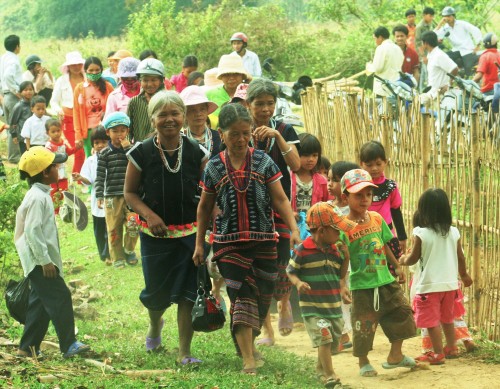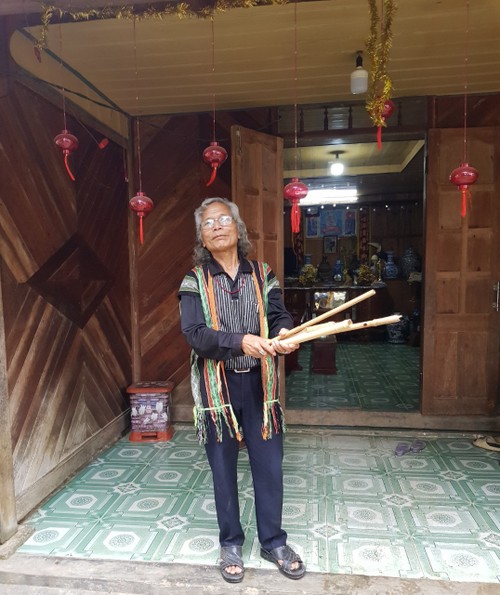 A wife's relatives go to her husband's family to attend the thanksgiving ceremony for parents-in-law. (Photo: Dang Nguyen) A wife's relatives go to her husband's family to attend the thanksgiving ceremony for parents-in-law. (Photo: Dang Nguyen) |
The Co Tu call the thanksgiving ceremony “pa’đăh”. It’s a party thrown by a son-in-law to pay tribute to his wife’s parents and other relatives. It’s seen as a second wedding ceremony, and is usually held several years after the couple begin their married life.
It’s not compulsory, but it is traditional for a son-in-law to pay tribute to his parents-in-law for giving birth to and raising his wife, because afer she gets married, she has less time to take care of her parents.
The thanksgiving ceremony for the parents-in-law is a solemn occasion. The son-in-law prepares offerings and gifts in proportion to his wealth.
“When the couple has a child, the husband organizes a ceremony to thank his parents-in-law for giving birth to the good, talented girl he married. He shows his gratitude by giving a buffalo to his wife’s family and organizing a party with drum and gong playing all night long. The wife’s family prepares food and drinks and, together with the husband’s family, they celebrate with gong and drum performances for 3 consecutive days. The two families also worship the deities, hoping to be blessed with good luck, a good harvest, and good health,” said Village chief Briu Po of Lang commune, Quang Nam province.
 Village chief Briu Po of Lang commune, Quang Nam province. (Photo: Ngoc Anh) Village chief Briu Po of Lang commune, Quang Nam province. (Photo: Ngoc Anh) |
On the first day, the ceremony includes just the family and close relatives. During the next two days, more relatives and neighbors come to attend the happy event. If conditions permit, they organize a traditional Tung Tung, Da Da dance.
If the ceremony includes a buffalo or cow, the parents-in-law invite the village to attend after the first day.
“The son-in-law thanks his parents-in-law by giving them something valuable, such as a buffalo, a cow, a pig, chickens, ducks, gongs, jars, and agate beads, or whatever precious things he has. He is grateful for his wife, and he thanks her parents for raising her and taking care of her. The thanksgiving ceremony helps build a happy family,” said Bhling Thi Trou, a Co Tu woman.
At the party, the husband’s family offers the best pieces of meat to the wife’s relatives. Meat and glasses of liquor are served to every member of the wife’s family.
Abing Lam, a Co Tu man who lives in Tay Giang district, said, “They invite both close and distant relatives and all the villagers. About 300 people come to the celebration. Many villagers help the host prepare the party. The thank-you gifts might include gongs, animals, alcohol, gold, and cash.”
Conscious of the phrase "live in a house, die in the house", Co Tu people don’t hesitate to give coffins and tombs as gifts to the living. In fact, coffins and tombs are the most precious thanksgiving gifts a son-in-law can give his wife's parents.
The Co Tu thanksgiving ceremony for parents-in-law is a long-standing custom designed to make the parents happy and proud of their children. It’s also an opportunity for the two families to meet and strengthen their relationship.